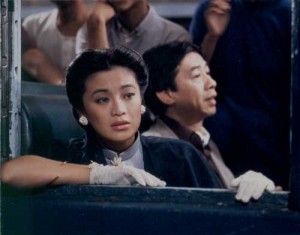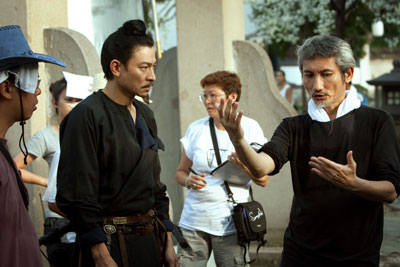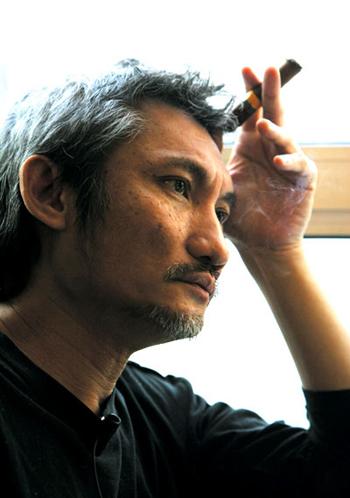We had the pleasure of interviewing Hong Kong cinema trendsetter and legend Tsui Hark (the man behind Zu: Warriors From The Magic Mountain, Once Upon A Time In China, Blade, Peking Opera Blues plus much more… not enough can be said so let’s not say too much!) who was kind enough to share with us his thoughts on the past and the now, including on Detective Dee: Mystery Of The Phantom Flame (available now on UK dvd and Blu Ray).
Podcast On Fire: Being on your 5th decade as director, producer, writer and actor in Hong Kong cinema, what are the first words that spring to mind when looking back at such a prolific career?
Tsui Hark: Well, nothing really springs into my mind in relation to so called prolific film career. Basically, it’s about the process of creating a movie and wanting to create a movie. I tend to look forward to predict and plan for the future, and seldom look back to the past to reflect what I have done.
POF: What would you consider being a first important part of your career, where did you feel it started to click for you personally and as an artist?
TH: Roughly, I separate my career into 4 parts:
The 1st stage is when I started getting into the industry, I was only thinking about how to shoot a script in the most innovative way possibly so that I could become a great director. Very soon I realized just doing that was not enough . One has to find more magic in cinema. From the experience I have when I was a teenager , I personally felt more excitement than I could feel the response of the audience who watched my movie at that time. Therefore, I went back to watch my favorite movies from the past and tried to find out how and why I was reacting so enthusiastically back then. Then I realized movies was not just about good scripts or interesting stories. Movie are psychologically or ideologically connected to the audience who are watching the screen as a reflection of themselves from a mirror.
 (poster for Tsui Hark’s 1979 debut movie The Butterfly Murders)
(poster for Tsui Hark’s 1979 debut movie The Butterfly Murders)
So I arrived at the second stage of my career. I was trying to work on something that could connect to the people more in order to generate more exciting energy other than the conceptual generic element like action or suspense or visual impact. That lasted a few years and then I came to my third stage. I started to look back in myself to find the reason why I was a filmmaker or why I had to be a filmmaker. I thought that a filmmaker should have two positions. One was to show his own individual view point about the time he’s living in and the way he looked at some of the issues. The second position is to record the things in his time so that people of the future will find the clues of the values and thoughts in his time. The fourth stage of my career is to see the possibility of filmmaking connected to the other aspects of the other media, such as internet, iphone horoscope or any new technology . Some current choices of certain lifestyles of one culture may affect the rest of the world. The events in media will directly or indirectly influence the people. Audiences and the filmmakers who get influenced by these things will develop a variety of different tastes and pursuits accordingly. These four stages of a career change from time to time according to ages and feelings to the society. Something may click in a certain stage but doesn’t click in the other.
To look back the work that I’ve done, I feel like watching the works of someone else. Therefore, I can only say that in order to define what clicked is when I felt the strong motivation to continue my filmmaking career.
POF: As a huge fan of Shanghai Blues and being a movie that unfortunately has not been seen widely enough, what’s your memories of it and how do you feel about it today?
 (Sylvia Chang and Wu Fung in 1984’s Shanghai Blues)
(Sylvia Chang and Wu Fung in 1984’s Shanghai Blues)
TH: As the first film of my company Film Workshop, it is very iconic and holds very important memories for me.
I tried to do the movie in a very low-budget way. Therefore scenes such as the night club one where Sylvia Chang is performing the dance, the background actually was made from cardboard and paper! For the street scenes, we didn’t spend money on decorating the street; we used miniature or the small size neon light to create the optical illusion for the background of the street. As for the scene at the train station at the end of the movie, we were supposed to have thousands of people in the scene. Since we did not have enough people on the platform, we turned around to the spectators who came to watch moviemaking after dinner on the other side of the railway. We asked them to come over to participate in the movie and to take off their modern accessories such as watches, glasses, ear phones, T-shirts, and clothes that betrayed the time of the movie. The motive to make Shanghai Blues was actually meant to be a challenge for myself to make a film with female characters in major roles. At the end of the day, Shanghai Blues led me to a different world of creativity. It made me see more details in the female characters, which affected my works in later years. One very special memory, especially since James Wong the composer is no longer with us, Shanghai Blues was the first movie that we collaborated on. I asked James to write a theme song for the movie, he ended up writing 3 plus the score he said he donated to the movie. The movie started our company Film Workshop but also my working friendship with James and a new look into my creativity.
POF: You took a little break seemingly from directing between Black Mask II and Seven Swords but have been on a steady work pace since then. Has anything changed in terms of your working habits and is this a real desire to continually make a movie or two every year?
TH: At the time between Black Mask II and Seven Swords, I did not actually stop creating script or ideas. In 2003, it was the beginning of my visit to China film industry. Before 2003 I was very much connected to Hong Kong investors but after Black Mask II I went to China and collaborated with investors there. During this change of location of my work, I was trying to set up a different basis of working in a new location. After Seven Swords I was looking back to Hong Kong again, trying to work out some projects. Then I decided to continue on a new direction, that’s why I switched back to Mainland China again!
POF: How did the Detective Dee and the Mystery of the Phantom Flame project originate? Are we talking a movie that’s been in development (hell?) for a number of years or how long was the process of bringing it to screen?
TH: I was making a movie called All About Women. Then Huayi Company invited me to be a director of their script “The Phantom Flame”. At this stage, “The Phantom Flame” actually had nothing to do with the phantom flame at all. It was a story very different to what we have now. For instance there was no giant Buddha that collapsed on the palace. I discussed with the producer and the script writer intending to give a iconic visual style for the first episode of “Detective Dee” series. Even though the producer of the movie Chen Kuo Fu did not show very high tendency to make the second episode, we are talking about the prequel now! Before “The Phantom Flame” I already had quite a lot of ideas and story about this character so when I received the script from Huayi, I didn’t feel much difficulty to adapt the story into something to what we are used to seeing nowadays.
POF: Working with the legendary talents of Andy Lau, Tony Leung Ka-fai, Carina Lau, Richard Ng, Teddy Robin Kwan, how does it feel to still be around and and around those actors who helped shape Hong Kong cinema over the years?
 (Andy Lau in Detective Dee: Mystery Of The Phantom Flame)
(Andy Lau in Detective Dee: Mystery Of The Phantom Flame)
TH: The main issue of the script is how to find Detective Dee and how to define Detective Dee. I have since long wanted to work with Andy Lau and thought that Detective Dee would be a very good playground for both of us. Also Carina Lau, I’ve never work with her before, even though we are friends for very long time. Empress Wu was a very very challenging role for her. At that moment of her career, she almost announced that she retired from the industry (I’ve worked with two famous actresses, one is Brigitte Lin, and another is Carina Lau. Both of them announced retirement from the industry but acted for my film which ended up with them arriving at a new page of their career. For Brigitte Lin it was the East Invincible role in Swordsman II. For Carina Lau it was Empress Wu). Tony Leung Ga-Fai, we’ve known each other for a long time. It was like a revisit to a very familiar feeling where we were making a movie together. Tony was fun on the set. He was not just an actor but he also helped as assistant director and was the best entertaining friend after work you could ever ask for. Sometimes, even during some production meetings, we involved Tony just for the support, ideas and fun he provided for us. His opinions and ideas enhanced the impact of the movie a lot. Interestingly, it is a big contrast between his real person and his role in the movie. Being a villain in the “The Phantom Flame” he was supposed to be a very complex character. But in real life he was just the opposite and I think there’s no one in the crew that would not miss him when he finished his work and departed from the production during the shooting.
As for Richard Ng, I always think he is a very funny deadpan comedian. Surprisingly, this was my very first time working with him. The first day he got on the set which was his hideout in the ghost city, the set was a disaster. It was built inside a cave where water flowed in from all directions when we poured the water. Unfortunately, we received severely bad weather and the set was like a leaking submarine with water shooting in like crazy. We had a very, very hard work day fighting with the humidity and the totally wet set. I enjoyed the fun to make Richard transform into Teddy Robin. All of them are very good friends. For Teddy Robin, working with him again was like passing through a time tunnel. Teddy Robin popped into my set and played a character almost similar to what he played for my early movie called All The Wrong Clues! Only this time Teddy was dressed in a period costume. For the character he played, he had to perform a very long monologue and I always have fun seeing him entangled by his nervousness from struggling with the long monologue. Hong Kong movies are what they are because of us. To people who ask me the question of how I look back at what I’ve done, I do not have any comments on it though. Maybe my memory is bad but the impression I have at this moment basically is like everyone is still around, the time has changed. And I feel that’s a blessing seeing friends getting older and more mature.
 (behind the scenes on ‘Detective Dee’)
(behind the scenes on ‘Detective Dee’)
POF: In your honest view, what state is Hong Kong cinema in at this time and where do you see the development of it heading?
TH: Hong Kong filmmaking has got into an interesting stage. Hong Kong filmmakers are connected to the world and Mainland China with bigger audiences and bigger market. Ironically, many people view Hong Kong movies as being at the low pitch compared to the past. But for me I think there have never been so many filmmakers, who have gone to the other part of the world to make movies and open up new market. As for now, Hong Kong filmmakers have the chance to show their movie in big markets such as China and other big markets in the West. I see much potential for filmmakers in Hong Kong to go into a more challenging state or creativity.
The first decades of the 21st century could be regarded as a learning curve for the Hong Kong filmmakers. I believe there will be more interesting things coming up in the coming decades.
Huge thanks to Louise Rivers for arranging for us this marvellous oppurtunity and Tsui Hark for taking time to sit down with us!
1 comment on “Interview: Tsui Hark”
Leave a Reply
You must be logged in to post a comment.

















Awesome interview, Loved reading this, keep up the magnificent work chaps 😉